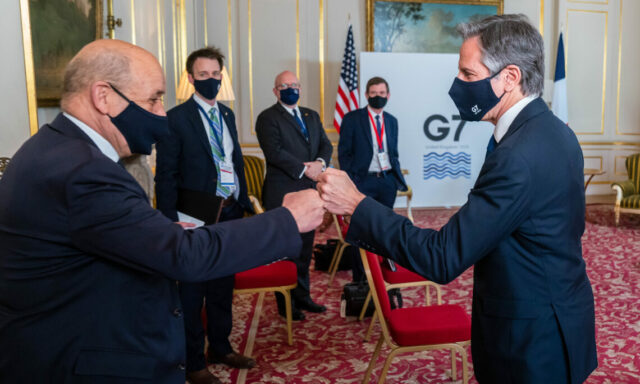NEW DELHI: It seems France and the US are ready to kiss and make up: Secretary of State Antony Blinken will be in Paris on Tuesday for talks with his French counterpart Jean-Yves Le Drian, “to identify the steps that will be needed to re-establish confidence between our two countries,” the French foreign ministry said.
France’s ambassador in Washington DC, Philippe Etienne, tweeted in support, “Honoured and grateful to @SecBlinken with whom we discussed—before his visit to Paris—our agenda of reengagement and rebuilding of trust, notably concerning the Indo-Pacific, our European Defense and the fight against terrorism in the Sahel.”
Observers say France’s bid for re-engagement was never in doubt. India’s former ambassador to France Rakesh Sood believes that France’s call for a strategically autonomous Europe was never likely to gain ground, as the US presence helps member countries keep defence budgets at 1% GDP and even lower. There is a realisation in France too that it cannot do without the US.
“The lesson they (France) will have learnt is to work with the US directly outside Europe and no one else. Nato currently is not doing much outside Europe. There will be more direct French-US collaboration in areas of interest such as Northern Africa,” Sood says.
But Europe-Australia ties need time to heal. In June this year, Australian Prime Minister Scott Morrison had been to Paris where documents had been signed and talk of strengthening the bilateral defence relationship had been discussed. This had then led to the 2+2 dialogue between the French foreign minister and defence minister and their Australian counterparts in late August.
Paris’ sense of betrayal (especially the loss of a multi-billion dollar submarine contract with Canberra) is particularly acute. Already, much expected trade talks between Europe and Australia have been delayed from October to November while the security relationship between London and Paris is likely to suffer. Both relationships are likely to see a cooling off for some time especially given the months-long negotiation for compensation that is likely to ensue going forward.
Sood emphasises that despite the recent events the common aim of curbing China in the IOR is likely to remain. Along with this, at home, both France, Germany and other European nations are putting the brakes on China economic activity. This puts an end to the idea of an ‘Africa Quad’ which President Xi Jinping had proposed during an online summit with President Macron and former Chancellor Angela Merkel on July 1 this year.
China and Europe should “view each other’s differences in a correct way, rationally handle divergences, and ensure ties between the two sides move forward,” the Chinese statement had said at the end of the summit. Notably, the French and German readouts made no mention of the Chinese president’s proposal.
Europe has been cracking down on Chinese economic activity in the region. Both Germany and France tightened down on technology export controls and the acquisition of strategic shares through greater government intervention. France has introduced the concept of “golden shares” which has allowed for increased state intervention. On Germany’s side, Sood points out that Berlin played a lead role in negotiating the Comprehensive Agreement on Investment (CAI) agreement in December last year but has since backpedalled.
“Coldness in the relationship between Europe and China is growing given that the CAI is not operationalised. Then concern about China has spread to some Eastern European countries as well. Lithuanians pulled out from China’s European cooperation forum entitled 17+1 thus making it 16+1,” said Sood. According to some reports, Lithuanian foreign minister Gabrelius Landsbergis has even urged other European countries to follow suit.
While India will welcome the fact that common views are likely to prevail on the China question, would New Delhi be concerned about how Aukus may affect the Quad? Probably not. Analysts believe the US’s reason for transferring nuclear submarines to Australia is to widen its options. Through Aukus, it can pursue a more military edge while through Quad more inclusive options are possible. The grouping’s focus on climate change and emerging technologies makes it possible for Asean and other countries to join in the future. This suits India which has always termed Quad as a “non-military alliance.”
On the question of India perhaps benefitting from the rift, Sood replies in the negative. “The phone call between the two leaders should not be seen as related to Aukus. If Prime Minister Modi had stopped over in France after his US trip there perhaps would have been some signalling which we could have taken note of. As of now its status quo for India.”
















